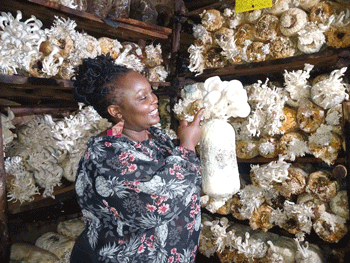Mushroom Farming a gem for an erudite urban farmer
Nowadays, it’s clear that in this era, farming requires more young people not only to secure Africa’s future food security but also to create a source of livelihood to an increasingly young population that is faced with bleak opportunities of employment.
It is obvious that quite a substantial number of young people have embraced agriculture as an agribusiness. One such person is Felister Wanjiru popularly referred to as “Shiro Bebs’ in the farming circles. She is carrying out her farming craft in Nairobi’s Baba Dogo area. She has specialized in cultivating mushrooms. Mushrooms are more than just a culinary delight; they are vital agents of decomposition in ecosystems and serve as a crucial source of food for numerous animals. She has christened her farm as Santashe Farm.
“Am an urban farmer, I love referring to my farming venture as a ‘concrete jungle’ because I farm in the middle of buildings and apartments. This Journey began 3 years ago post Covid 19 out of necessity when her previous business shuttered during the COVID-19 pandemic. “I had bills to cater for, my child was young, and life in Nairobi revolves around money. I had to act quickly before I was grounded,” she said. I was attracted to mushrooms when I paid a visit to my mother and found her listening to a local radio station that was enlightening people on mushroom farming. This form of farming got my traction because it doesn’t require lots of space and it can be done in town so I didn’t have to relocate to my rural area to carry it out,” she stated.
Mushrooms are more than just a culinary delight; they are vital agents of decomposition in ecosystems and serve as a crucial food source for numerous animals. Research scientists highlight the essential role mushrooms play in breaking down organic matter, recycling nutrients back into the soil, and maintaining ecological balance. “Apart from popping in the ecosystem, mushrooms are becoming regular guests on restaurant menus, in grocery stalls as more farmers continue to embrace them,” said Susan Kabacia, a Research Scientist specializing in Fungi taxonomy at the National Museums of Kenya (NMK).
“It has been a tough and exciting farming journey. Every day to me is a learning process and perfecting my craft so that I would be able to produce more volumes,” says the soft-spoken,” Shiro Bebs.
There are four popular mushroom species currently grown; Button Agaricus bisporus, Oyster Pleurotus spp, Shiitake Lentinula edodes and Reishi Ganoderma lucidun. Out of the four, Oyster variety is the easiest to cultivate; growing in a wide range of substrates and temperatures, and thus referred to as ‘mushrooms for all seasons’.
However, Button mushroom has the highest demand, with Kenya importing up to 80,000 tonnes to satisfy its tourist industry. This is due to its complicated growing process that makes many farmers shun it. But with the knowhow, this variety pays handsomely. A 250gms sachet retails at Ksh200 in the open market hitting to lows of at least Ksh150.
Fast forward three years, and Wanjiru’s mushroom business has flourished, becoming a lucrative endeavor. After receiving training from seasoned mushroom farmers and the National Museums of Kenya, she started with spawns worth Sh 5,000.
“I bought 10 bales of rice husks which I composted and mixed with mushroom spawns. I prepared 100 bags which produced at least 1 to 1.5 kg,” she said. With a kilo selling for Sh 600, Wanjiru earned approximately Sh 60,000 from her first harvest. Encouraged by this success, she expanded her production significantly.
“At the moment, I prepare 1,500 to 2,000 bags, yielding at least 2,000 kilos. With a kilo going for Sh 600, I am in business,” she said. Today, Wanjiru earns at least Sh 400,000 a month and has become an employer, providing jobs for six people—three permanent and three casual workers.
To achieve maximum production, Wanjiru ensures that her growing room is well-ventilated with controlled temperature and humidity. She grows two varieties of mushrooms: Oyster and button (white).
Her farming process involves several meticulous phases. First, she and her employees prepare compost from rice husks, which are boiled to kill germs and other contaminants. The compost is then cooled down and turned every two to three days to allow it to rot and for nutrients to concentrate. After 14 days, the compost is complete when it turns dark brown and becomes pliable. It is then pasteurized to kill bacteria and weed seeds and to remove ammonia, making the substrate ready for the growth of mushroom mycelium.
“Mushrooms are medicinal and rich in nutrients,” she said. Mushrooms contain high amounts of selenium, vitamin D, and vitamin B6. Selenium can help prevent cell damage in our bodies, vitamin D helps with cell growth, and vitamin B6 aids in forming red blood cells. “All of these nutrients in mushrooms help to maintain a healthy immune system,” she added.
More than 100 medicinal functions are produced by mushrooms and fungi, including antioxidant, anticancer, antidiabetic, antiallergic, immunomodulating, cardiovascular protector, anticholesterolemic, antiviral, antibacterial, antiparasitic, antifungal, detoxification, and hepatoprotective effects.
As mushrooms continue to prove their worth both environmentally and economically, their popularity is set to soar, benefiting ecosystems and communities alike.



